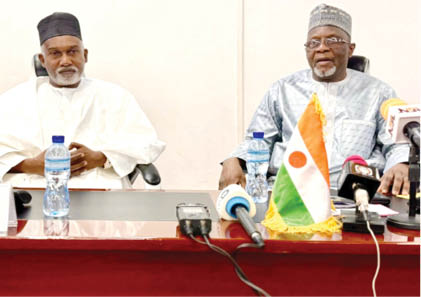Officials from Nigeria and Niger convened in Niamey this week, signalling a fresh effort to restore the fractured relationship between the two neighbouring countries.
Nigeria’s Foreign Affairs Minister, Yusuf Maitama Tuggar, led a senior delegation that arrived Tuesday in the Nigerien capital. The team carried a personal message from Nigerian President Bola Ahmed Tinubu to Niger’s transitional leader, General Abdourahamane Tchiani.
The visit represents a diplomatic push to rebuild ties that have deteriorated since the political upheaval in Niger last July.
In a joint statement released after the high-level discussions, both countries reaffirmed a shared commitment to regional cooperation. The statement highlighted mutual interests in trade, infrastructure development, and border security, and emphasized the need to reenergise the Nigeria-Niger Joint Commission (NNJC), a platform for bilateral engagement that had lost momentum in recent years.

The talks, described as cordial and constructive, addressed multiple cross-cutting issues—from cross-border infrastructure like the Trans-Saharan Gas Pipeline and regional rail links, to shared concerns over migration, agriculture, and the growing threat of violent extremism along their shared frontier.
Security cooperation was a priority topic. Both delegations acknowledged the persistent instability in border regions and agreed to enhance collaboration between their defence establishments. There was also a consensus to increase technical-level meetings and establish a bilateral consultative forum for sustained dialogue.
Despite speculation in diplomatic circles about which side initiated the talks, sources close to the matter suggested the outreach may have been quietly encouraged by Niamey, though officials have remained tight-lipped on the matter.
Observers say the renewed contact signals a potential thaw in relations following a period marked by ECOWAS sanctions, economic hardship, and public acrimony. A former Nigerian diplomat described the engagement as timely and necessary, cautioning that both sides must now act with political maturity to avoid further strain.
The diplomatic chill followed ECOWAS’s hardline response to the Nigerien coup, including trade restrictions and the threat of military intervention—measures in which Nigeria played a leading role. The fallout affected fuel supplies, border communities, and collaborative anti-terror operations.
In recent months, there has been increasing concern over the fragmentation of regional unity, particularly after Niger, Mali, and Burkina Faso announced their exit from ECOWAS to form the Alliance of Sahel States. This shift has challenged Nigeria’s traditional role as a stabilising force in West Africa.
However, ongoing infrastructure and trade initiatives—including shared energy and rail projects—suggest both nations recognise the importance of cooperation, regardless of political differences.
Whether this latest dialogue results in a lasting détente remains to be seen, but officials on both sides appeared optimistic that the foundation has been laid for a more constructive phase in their long-standing relationship.



